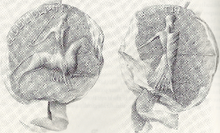Richard de Clare, the 2nd Earl of Pembroke
| Richard fitz Gilbert de Clare | |
|---|---|

An image of the seal of Richard de Clare.
|
|
| Born | 1130 Tonbridge, Kent, England |
| Died |
20 April 1176 (age 45/46) Dublin, Ireland |
| Resting place | Christ Church Cathedral, Dublin. |
| Other names | Strongbow |
| Spouse(s) | Aoife Ní Diarmait |
| Children |
Gilbert de Clare Isabel de Clare, Countess of Pembroke |
| Parent(s) |
Gilbert de Clare, 1st Earl of Pembroke Isabel de Beaumont |
Richard fitz Gilbert de Clare, 2nd Earl of Pembroke (of the first creation), Lord of Leinster, Justiciar of Ireland (1130 – 20 April 1176) was an Anglo-Norman lord notable for his leading role in the Anglo-Norman invasion of Ireland. Like his father Gilbert de Clare, Richard de Clare was commonly known by the nickname Strongbow.
Richard's cognomen Strongbow has become the name he is best known by, but it is unlikely that he was called that at the time. Cognomens of other Cambro-Norman and Norman lords were exclusively Norman-French as the nobility spoke French and, with few exceptions, official documents were written in Latin during this period. The confusion seems to have arisen when Richard's name was being translated into Latin. In the Domesday Exchequer annals between 1300 and 1304 (over 120 years after his death) it was written as "Ricardus cognomento Stranghose Comes Strugulliae (Richard known as Stranghose earl of Striguil)." This chronicler erroneously has attributed Stranghose (foreign leggings) as a cognomen, where it is much more likely a variant spelling or mistranscription of Striguil, which is called Strangboge, Stranboue or Stranbohe in other transcriptions. It is in the fourteenth century that we have Richard's name finally rendered as Strongbow "Earl Richard son of Gilbert Strongbow [earl of Shropshire]."
Richard de Clare was the son of Gilbert de Clare, Earl of Pembroke, and Isabel de Beaumont, daughter of Robert de Beaumont, Earl of Leicester. The exact date of Richard de Clare’s birth is unknown, but the fact that he was old enough to witness his father's charters for Lewes and Southwark priories suggests that he had fully matured before his father’s death in 1148. He was probably therefore born in 1130.
As an Anglo-Norman, Richard de Clare was descended from the Norman invaders who, under the leadership of William the Conqueror, displaced most of the traditional Anglo-Saxon ruling class after their successful conquest of England in 1066. Richard’s surname ‘de Clare’ is derived from the village of Clare in the English county of Suffolk. Richard’s ancestor and namesake Richard fitz Gilbert, who was the progenitor of the de Clare family, appears to have adopted the name ‘de Clare’ after being awarded lands in Clare by William I for his participation in the Norman invasion of England. The de Clare’s lands were not restricted solely to Suffolk however. Richard’s father Gilbert de Clare, like many other Anglo-Norman families, expanded his family’s holdings significantly by conquering new territories in Wales. King Stephen recognised Gilbert’s newly-acquired lands in 1138 and granted him the title ‘Earl of Pembroke’.
...
Wikipedia
